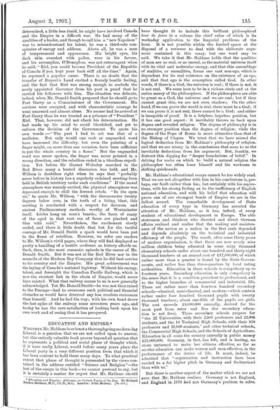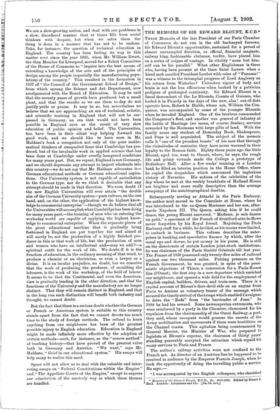EDUCATION AND EMPIRE.* WHETHER Mr. Haldane is or is not
a thoroughgoing modern-day Liberal is a question that we are not called upon to answer, but this entirely valuable book proves beyond all question that he represents a political and social phase of thought which, if it were really Liberal, would before many years place the Liberal party in a very different position from that which it has been content to hold these many days. To what practical extent that phase of thought is permeated by the views con- tained in the address entitled "Science and Religion "—the last of the essays in this book—we cannot pretend to say, but it is certainly a matter for regret that Mr. Haldane should
• Education and Empire : Addresses on Certain Topics of the Day. By Richard Burdon Haldane, M.P., LL.D., K.C. London : John Murray. [58. net.) have thought fit to include this brilliant philosophical tour de farce in a volume the chief value of which is its workaday application to the Imperial problems of the hour. It is not possible within the limited space at the disposal of a reviewer to deal with the elaborate argu-
ment contained in this essay, but one word may be said. We take it that Mr. Haldane holds that the qualities of man are as real, or as unreal, as the material universe itself with its vital and molecular energy, and that this assemblage of realities, or unrealities, forms one vast non-ego, which is dependent for its real existence on the existence of an ego, and that that ego is the conception called God. In other words, if there is a God, the universe is real ; if there is not, it is not real. We seem here to be in a vicious circle and at the entire mercy of the philosophers. If the philosophers are able to grant us a God, the universe and we are real ; but if they
cannot grant this, we are not even shadows. On the other hand, if we can prove the world is real, there *must be a God ; if we can prove it is not real, there cannot be a God; and either is incapable of proof. It is a helpless, hopeless position, but it has one good aspect : it inevitably throws us back upon dogma and revealed religion. The dogma of philosophy is in no stronger position than the dogma of religion; while the dogma of the Pope of Rome is more attractive than that of the Bishop of Cloyne. We trust that we have missed the logical deduction from Mr. Haldane's philosophy of religion, and that we are wrong in the conclusions that seem to us the inevitable deductions from his argument. But, frankly, we distrust this digging for "deeper foundations of belief." In delving for rocks on which to build a natural religion the philosopher too often loses himself and his workmen in shifting quicksands.
Mr. Haldane's educational essays cannot be too widely read. That we are not altogether with him in his conclusions is, per- haps, our fault rather than his ; but certainly with his aspira- tions, with his strong feeling as to the inefficiency of English national education, and with his belief that education will prove one of our strongest bonds of Empire we are in the fullest accord. The remarkable development of State education of every type in Germany has arrested the attention of Mr. Haldane, as it has, indeed, of every student of educational development in Europe. The able statesmen and thinkers who directed and direct German affairs realised and realise that the making and mainten- ance of the nation as a nation in the first rank depended and depends absolutely on the technical and industrial efficiency of the people. The result, after some thirty years of anxious organisation, is that there are now nearly nine million children being educated in some sixty thousand elementary schools under about one hundred and thirty-eight thousand teachers at an annual cost of £17,500,000, of which rather more than a quarter is found by the State Govern- ments, and rather less than three-quarters by local rating authorities. Education in these schools is compulsory up to fourteen years. Secondary education is only compulsory in the sense that it is a condition precedent to professional, and to the higher branches of commercial and industrial, life. There are rather more than fourteen hundred secondary schools—classical, semi-classical, and modern—which contain rather under four hundred thousand pupils with twenty thousand teachers ; about one-fifth of the pupils are girls. The cost exceeds £4,000,000 annually, derived for the most part from rates and fees (for secondary educa- tion is not free). These secondary schools prepare for "the 22 Universities, with their 2,500 professors and 22,000 students, and the 10 Technical High Schools, with their 850 professors and 11,000 students," and other technical schools, the Commercial High Schools, and the Schools of Agriculture. Education in all costs the country annually in public money £25,000,000. Germany, in fact, has left, and is leaving, no stone unturned to make her citizens effective, so far as secular education can make women and men effective, in the performance of the duties of life. It must, indeed, be admitted that "organisation and instruction have been carried to a far higher pitch in Germany and Switzerland than with us."
But there is another aspect of the matter which we are not sure that Mr. Haldane realises. Germany is not England, and Fngjand in 1870 had not Germany's problem to solve.
We are a slow-growing nation, and deal with our problems in a slow, disordered manner that at times fills keen social thinkers with despair, but when we solve them the thing is done in a manner that has not to be undone. Take, for instance, the question of technical education in England. The country has been feeling its way in this matter ever since the year 1835, when Mr. William Ewart, the then Member for Liverpool, moved for a Select Committee of the House of Commons to "inquire into the best means of extending a knowledge of the arts and of the principles of design among the people (especially the manufacturing popu- lation) of the country." This resulted in the formation in 1837 of "the Council of the Government School of Design," from which sprang the Science and .Art Department, now amalgamated with the Board of Education. It may be said that the seventy years of growth have produced but a small plant, and that the results as we see them to-day do not justify pride or praise. It may be so, but nevertheless we believe that we are approaching an era of technical, artistic, and scientific training in England that will not be sur- passed in Germany, an era that would not have been possible in England save as the result of very slow education of public opinion and belief. The Universities, too, have been in their silent way helping forward the good work, and we should like to have seen in Mr. Haldane's book a recognition not only of the pure mathe- matical thinkers of unequalled fame that Cambridge has pro- duced, but of the invaluable work in applied science that has been done at Cambridge under cruelly hampered conditions for many years past. But, we repeat, England is not Germany, and we should deprecate any attempt to import wholesale into this country—we do not say that Mr. Haldane advocates it— German educational methods or German educational aspira- tions. Our University system is not capable of assimilation to the German type, nor do we think it desirable that any attempt should be made in that direction. We even doubt if the new English Universities will ever attain "the double aim of the German University system—pure culture, on the one hand, and, on the other, the application of the highest know- ledge to commercial enterprise"—though we do believe that all the Universities will accomplish what Cambridge has been doing for many years past,—the training of men who on entering the workaday world are capable of applying the highest know- ledge to commercial enterprise. When the separate pieces of the great educational machine that is gradually being fashioned in England are put together the end aimed at will surely be, not the production of a highly finished pro- ducer in this or that walk of life, but the production of men and women who have an intellectual and—may we add ?—a spiritual outfit for the work of life. We doubt if it is the function of education, in the ordinary meaning of that word, to produce a chemist or an electrician, or even a lawyer or a divine. It is an insular prejudice, no doubt, but we conceive that the work of producing the producer, of moulding the labourer, is the work of the workshop, of the field of labour. It seems to us that the Continental, and even the American, view is gradually tending in the other direction, and that the functions of the University and the manufactory are no longer distinct. That they will remain distinct in England, and that in the long run such distinction will benefit both industry and thought, we cannot doubt.
But the fact that there is a serious doubt whether the German or French or American system is suitable to this country stands apart from the fact that we cannot devote too much time to the study of foreign methods. The refusal to learn anything from our neighbours has been of the greatest possible injury to English education. Education in England might be made infinitely more effective by the adoption of certain methods—such, for instance, as the "source method" of teaching history—that have proved of the greatest value both in Germany and America. "We want," says Mr. Haldane, " Geist in our educational system." His essays will help many to realise this need.
Space will not allow us to deal with the valuable and inter- esting essays on "Federal Constitutions within the Empire" and," The Appellate Courts of the Empire," except to express our admiration of the masterly way in which those themes are handled.







































 Previous page
Previous page